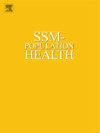日本的疫苗接种决策与社会资本
IF 3.1
2区 医学
Q1 PUBLIC, ENVIRONMENTAL & OCCUPATIONAL HEALTH
引用次数: 0
摘要
COVID-19疫苗在保护许多人方面发挥了关键作用。然而,由于许多高收入国家面临长期的拒绝接种疫苗运动,疫苗犹豫仍然是提高覆盖率的一个重大障碍。在日本,疫苗剂量是通过网站和电话预订系统进行的。在日本,要实现一种免费提供的疫苗的高接种覆盖率也异常困难。在许多国家,鉴于政府有争议的社会距离规定,大流行期间的疫苗犹豫与人们对政府的信任密切相关。在日本,封锁是自愿的,接种疫苗也不是强制性的。由于政府的政策没有重大的政治冲突,疫苗接种的接受程度受到更基本原则的影响,我们在这里关注社会资本,定义为使社会有效运作的凝聚力联系。在这种情况下,社会资本指的是在个人和社会之间建立社会纽带的社区信任、合作和参与。通过在大流行期间反复进行的一项独特的大型调查,我们发现,社会资本对疫苗接种决定很重要这一假设基本得到了支持;即使我们控制了机构信任(尤其是对医疗系统的信任),这也很重要。然而,对其他社区成员的信任,对社区成员参与互助意愿的信念,以及对社区支持个人的更普遍意愿的信念之间的普遍关联,都与疫苗接种决策以及对疫苗接种表达的观点有不同的关联。从政策角度来看,这表明即使在对政府的信任不是一个重大问题的情况下,社区内信任(即结合社会资本)也很重要。本文章由计算机程序翻译,如有差异,请以英文原文为准。
Vaccination decisions and social capital in Japan
The COVID-19 vaccines played a pivotal role in safeguarding many people. Yet, vaccine hesitancy remained a significant barrier to increasing coverage rates, as many high-income countries faced prolonged vaccine refusal campaigns. In Japan, vaccine doses were administered under a reservation system accessible via a website and by phone. Achieving a high vaccination coverage for a vaccine that was offered at no financial cost was surprisingly difficult in Japan as well. In many countries, vaccine hesitancy during the pandemic has been closely related to people's trust in their governments given governments' controversial social distancing mandates. In Japan, lockdowns were voluntary, and vaccinations were also not mandated. As there were no significant political conflicts about the government's policies, vaccination acceptance was influenced by more basic tenets, and we focus here on social capital, defined as cohesive links that enable a society to function effectively. Social capital, in this context, refers to community trust, collaboration, and engagement that create social bonds between individuals and society. Using a uniquely large survey, administered repeatedly through the years of the pandemic, we mostly find support, for the hypothesis that social capital matters for the vaccination decision; and that it matters even once we control for institutional trust (especially trust in the medical system). However, this general association between trust in other community members, belief in the willingness of community members to engage in reciprocal assistance, and belief in the more general willingness of the community to support individuals, were all associated differently with the vaccination decision, and with the views expressed about the vaccinations. From a policy perspective, this suggests that intra-community trust (i.e., bonding social capital), is important even in contexts when trust in governmental is not a significant concern.
求助全文
通过发布文献求助,成功后即可免费获取论文全文。
去求助
来源期刊

Ssm-Population Health
PUBLIC, ENVIRONMENTAL & OCCUPATIONAL HEALTH-
CiteScore
6.50
自引率
2.10%
发文量
298
审稿时长
101 days
期刊介绍:
SSM - Population Health. The new online only, open access, peer reviewed journal in all areas relating Social Science research to population health. SSM - Population Health shares the same Editors-in Chief and general approach to manuscripts as its sister journal, Social Science & Medicine. The journal takes a broad approach to the field especially welcoming interdisciplinary papers from across the Social Sciences and allied areas. SSM - Population Health offers an alternative outlet for work which might not be considered, or is classed as ''out of scope'' elsewhere, and prioritizes fast peer review and publication to the benefit of authors and readers. The journal welcomes all types of paper from traditional primary research articles, replication studies, short communications, methodological studies, instrument validation, opinion pieces, literature reviews, etc. SSM - Population Health also offers the opportunity to publish special issues or sections to reflect current interest and research in topical or developing areas. The journal fully supports authors wanting to present their research in an innovative fashion though the use of multimedia formats.
 求助内容:
求助内容: 应助结果提醒方式:
应助结果提醒方式:


